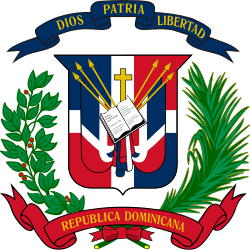LGBT history in the Dominican Republic
The act of public displays of homosexuality is illegal in the Dominican Republic. Sexual encounters that occur in private between two adults is legal. If acts are made public, one could be subject to face up to two years in prison.[1] Although homosexuality was decriminalized, LGBT Dominicans still endure discrimination and violence due to their sexual orientation and/or sexuality identity. Members of the LGBT Community in the Dominican Republic are victims of hate crimes, extortion by the police, and discrimination when it comes to resources and employment services. Health care systems also face discrimination when seeking treatment from health care systems.[2] Since the year 2006, there have been over 30 reports of possible hate crimes against transgender people that have been reported. In a 2014 poll, almost three quarters, 73%, of people in the Dominican Republican alone have said that members of the LGBT community have experienced some sort of violence or discrimination.
Due to employment discrimination against LGBT members, a lot of transgender women resort to sex work.[2]
In 2001, the prevalence rate for HIV/AIDS was 2.5 percent among adults between the ages of 15–49 years old. This number is four times the rate of that in the United States.[1]
Laws pertaining to homosexuality
Homosexuality in the Dominican Republic was decriminalized in 1822.[3]
- Since June 17, 1944, same-sex marriage has been unrecognized by the country. Their constitution states that marriage is a union between a man and a woman.[4] In 2010, once the new constitution was written again, it included that same-sex marriage was prohibited.[2]
- On July 1, 2001, the first Gay Pride parade was held in Santo Domingo.
- As of January 24, 2007, Homosexuality is legal within the Dominican Republic.[4] However, there are no laws that protect LGBT members from discrimination in housing and places of employment.[4]
- [2] Law 285-66 prohibits LGBT people from serving as members of the police force. Under this law, police officers are also prohibited officers from engaging in sodomy.[5] In 2014, the law was confirmed that LGBT members were prohibited from joining any police force.[5]
- Homosexuality is seen as a disease. Exercises such as electroshocks.[6] Conversion therapy is legal in the Dominican Republic.[4]
References
- 1 2 Reding, Andrew. "World Policy Reports: Sexual Orientation and Human Rights in the Americas" (PDF). worldpolicy.org.
- 1 2 3 4 "LGBT Issues in the Dominican Republic" (PDF). Human Rights First.
- ↑ "Where is it illegal to be gay?". BBC News. Retrieved 23 February 2014.
- 1 2 3 4 "LGBT Rights in Dominican Republic | Equaldex". www.equaldex.com. Retrieved 2017-05-04.
- 1 2 "LGBT Issues in the Dominican Republic" (PDF). humanrightsfirst.org.
- ↑ "Report by the Coalition LGBTTI (CLGBTTI) of the Dominican Republic".
